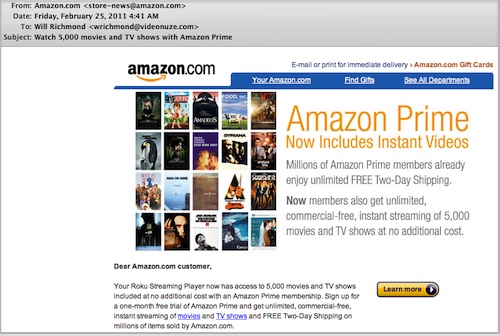-
Amazon is Still a Paper Tiger in Online Video Subscriptions
Since Amazon introduced a streaming video benefit in its Prime service almost 2 weeks ago, there have been plenty of people suggesting that the move was a game-changer in online video subscriptions. Eventually that may be the case. But for now, Amazon's streaming video strategy appears very underwhelming and is unlikely to change industry dynamics much at all. When compared to the effort and resources Amazon has put into the Kindle, for example, streaming video looks more like a side project than a high-priority company initiative.
As I wrote in my initial review, the pervasive problem in Amazon's approach to streaming video is the absence of a clearly defined video brand or value proposition. The fact that Amazon decided to staple video streaming onto the Prime membership program says a lot about how Amazon views video for now: as a supporting player to more important company revenue drivers like Prime, rather than a star in its own right.
It's not as if Amazon doesn't understand the importance of branding either. According to company lore, even the choice of "Amazon" as the company's name was meant to evoke size and strength. More recently, Kindle has been a win because it is simple and has a focused value proposition on e-books. In fact, Amazon actually seemed to be building a video brand up until 2 weeks ago: "Amazon VOD," its foray into online rentals and downloads. But peruse the Amazon site now and "Amazon VOD" is missing. In its place are a few text-only references to "Amazon Instant Video."
The lack of a video brand or willingness to invest in one is evident in Amazon's marketing. The initial press release highlighted Prime, and referenced video merely as "this new benefit is being added at no additional cost." Go to Amazon.com and click on "Unlimited Instant Videos" and you'll immediately start seeing the links to sign up for Prime, rather than anything that touts an amazing new video product or service. When it comes to follow-on promotion, as an Amazon shopper, I've only received 1 email about video streaming in the past 2 weeks, and, as expected, it highlights Prime, with instant videos positioned as a new benefit.
Maybe Amazon thinks all this adds up to enough to compete with Netflix and others, but I doubt it. Without a distinct video brand or a cohesive, powerful video message, Amazon won't breakthrough the noisy landscape, and therefore will remain a second tier video player. And evidence is scarce that Amazon is going to spend big on high-profile content that puts it on a par with Netflix. As I argued 2 weeks ago, unless it sees significant lift in Prime memberships from video's addition - which is a big question mark - there's no way Amazon is going to go on a Hollywood content acquisition spree.
If video were really key to Amazon, then not only would it have created a strong brand (or at a minimum just embraced Amazon VOD), it also would have provided launch firepower such as a Jeff Bezos-hosted event (as he's done with Kindle) accompanied by high-profile new content and device partners. I mean, would Steve Jobs ever launch an important new product this way? Even the latest version of iMovie gets more CEO visibility! Last, but not least, Amazon missed the boat by not recruiting an industry leader (like Hulu's Jason Kilar, as I suggested a few weeks ago) to head up its video efforts, further signaling its corporate commitment.
For now Amazon has come up woefully short. Video is still not a top priority for Amazon, nor has it ever really been. That's a shame because Amazon has all the assets to be a major video player, but for whatever reason, it just doesn't seem to want to go for it. Until it does Amazon will remain a paper tiger in online video subscriptions.
What do you think? Post a comment now (no sign-in required).
Categories: Aggregators
Topics: Amazon

